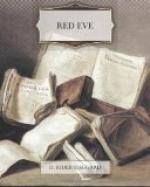David dismounted and knocked on it, but none answered.
“An empty house belongs to no one,” said Dick; “at any rate in these times. Let us enter.”
They did so, and saw that the place was sumptuously appointed. Though ancient, it was not large, having, as they afterward discovered, been a fortification on an outer wall now demolished, which had been turned to the purposes of a dwelling. Leaving the hall out of which opened the refectory, they mounted a stone stair to the upper chambers, and entered one of them.
Here they saw a strange and piteous sight. On a bed, about which candles still burned, lay a young woman who had been very beautiful, arrayed in a bride’s robe.
“Dead of the plague,” said Hugh, “and deserted at her death. Well, she had better luck than many, since she was not left to die alone. Her dress and these candles show it.”
“Ay,” answered Dick, “but fear took the watchers at last and they are fled. Well, we will fill their place, and, if they do not return to-morrow, give her honourable burial in her own courtyard. Here be fine lodgings for us, master, so let us bide in them until the rightful owners cast us out. Come, David, and help me raise that drawbridge.”
Fine lodgings these proved to be indeed, since, as they found, no house in Avignon was better furnished with all things needful. But, and this will show how dreadful were the times, during these days that they made this their home they never so much as learned the name of that poor lady arrayed in the bride’s dress and laid out upon her marriage bed.
In the butteries and cellar were plentiful provisions of food. Having eaten of it with thankfulness, they chose out one of the bed-chambers and slept there quite undisturbed till the morning sun shone in at the window-places and awoke them. Then they arose, and, digging a shallow grave in the courtyard with some garden tools which they found in a shed, they bore out the poor bride, and, removing only her jewels, which were rich enough, buried her there in her wedding dress. This sad duty finished, they washed themselves with water from the well, and breakfasted. After they had eaten they consulted as to what they should do next.
“We came here to lay a certain cause before his Holiness,” said Hugh. “Let us go up to the palace, declare our business and estate, and ask audience.”
So, leaving David in charge of the house, which they named the Bride’s Tower because of the dead lady and the little keep which rose above it, and of the horses that they had stalled in the stable, they went out and made their way to the great entrance of the Pope’s palace. Here they found the gates shut and barred, with a huge fire burning behind them.
Still they knocked until some guards appeared armed with cross-bows, and asked their business. They said they desired to see his Holiness, or at least one of his secretaries, whereon the guards asked whence they came. They replied from Italy, and were told that if so they would find no entrance there, since the Death had come from Italy. Now Hugh gave his name and stated his business on hearing which the guards laughed at him.




